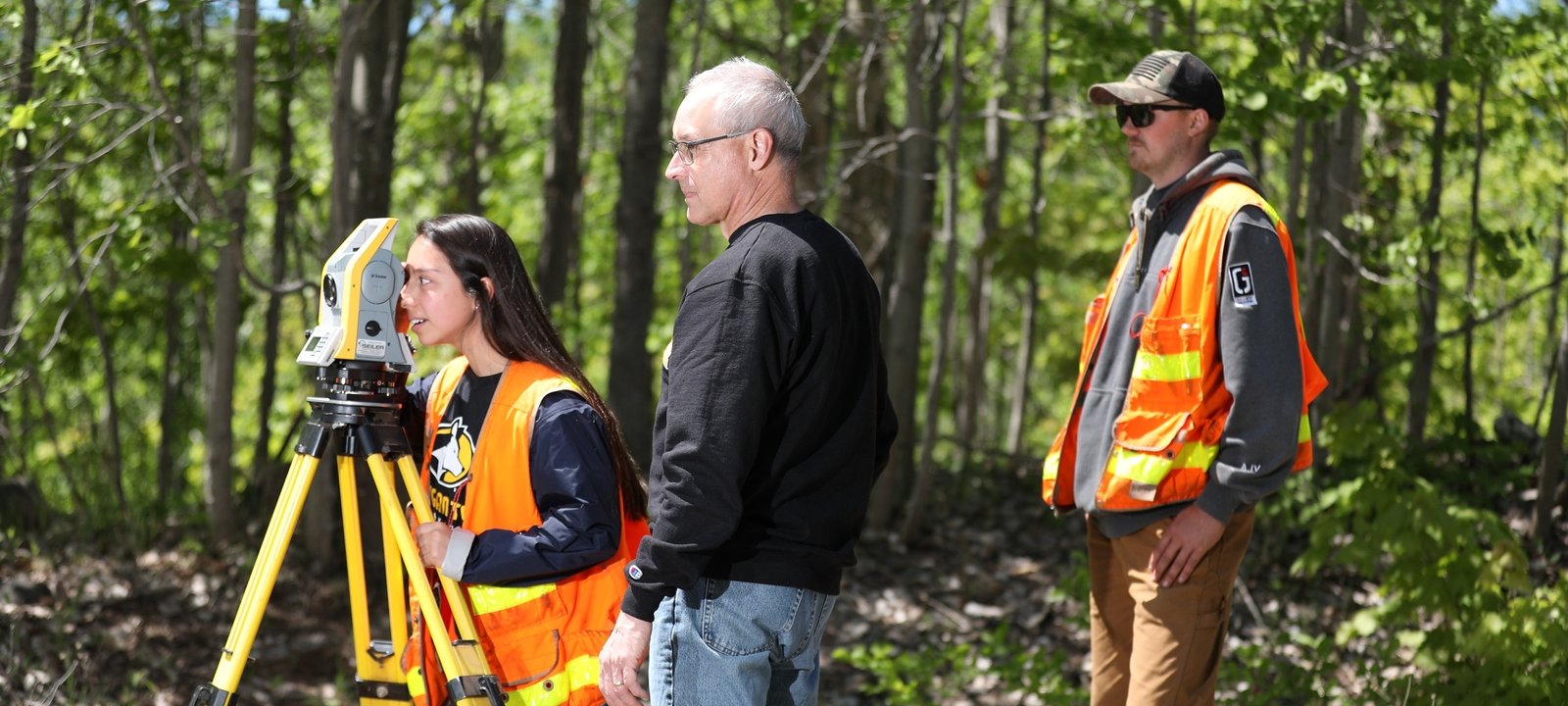What if you had a high-tech job, but spent your work day outside, enjoying nature and fresh air each day? If you like computing and the great outdoors, you may excel at geospatial engineering.
As licensed professionals, our faculty provide students with real world experiences. Studying geospatial engineering is both an adventure and a learning experience. Geospatial engineers are surveyors. They measure the physical features of the Earth with great precision and accuracy. Geospatial engineers calculate the position, elevation, and property lines of parcels of land.
Request Information
Form loading . . .
Our students learn about geospatial systems and spatial data acquisition technologies. Such methods rely on high-precision optical and electromechanical instruments. Learn satellite and aerial remote earth observation systems. Use aerial and terrestrial lidar, as well as Global Navigation Satellite Systems (GNSS). Our curriculum includes the use of Unmanned Aerial Systems (UAS) and High Definition Surveying. Become familiar with Geographic Information Systems (GIS). Try out traditional surveying technologies and other options in the geospatial engineering toolbox.
The Bachelor of Science in Geospatial Engineering orients you for the state professional surveyor's exam. Geoinformatics topics include GIS, photogrammetry, and remote sensing. Professional surveying prepares students to become State Licensed Professional Surveyors. A core focus is the accurate location of real property boundaries. This includes data capture of the natural/man-made objects on the earth's surface. We often use methods of digital mapping in design or planning.
Tomorrow Needs Geospatial Engineers
Many different industries need the expertise of geospatial engineers. You can work with architectural and engineering firms. Collaborate with government and real estate agencies. Share a project with mining companies. Industries also rely on the geospatial data and products that geospatial engineers provide. The need is increasing with advances in technology.
Be Career-Ready
With a 100% job placement rate for graduates, you'll be ready to engineer a better tomorrow. Learn field practice, boundary law, and geospatial monitoring. Practice geoinformatics, GPS, GIS, and photogrammetry. Use geodesy, spatial data adjustments, remote sensing, and hydrographic surveying. Tomorrow needs geospatial engineers who can measure, model, and perform. Be agile on the job from day one. We're ready. Are you?
Explore career opportunities for geospatial engineers.
- Professional Surveyor
- Geographic Information Systems Professional (GISP)
- Photogrammetrist (CP)
- Surveying Engineer
- Geospatial Engineer
What is Geospatial Engineering?
Geospatial engineering is a field that combines principles of engineering, geography, and surveying to collect, analyze, and manage spatial data.
It involves the use of various technologies such as Geographic Information Systems (GIS), Global Positioning Systems (GPS), remote sensing, and computer-aided design (CAD) to capture, store, manipulate, analyze, and visualize geographic information.
Geospatial engineers work on projects related to land surveying, mapping, urban planning, environmental assessment, infrastructure development, disaster management, and natural resource management. They use their expertise to create accurate maps, models, and databases that help in decision-making processes for various industries including transportation, agriculture, telecommunications, and urban development.
Geospatial engineering plays a crucial role in understanding and managing the spatial aspects of our world, enabling better planning, resource allocation, and problem-solving.
Common applications include mapping and measuring various aspects of the earth.
Jacob Wysko on Geospatial ImageryEver since I was young, I’ve always had a keen interest in mapmaking and cartography. I liked to make detailed maps of the house and property that I grew up in. Finding out that there is a degree and career based around making detailed and accurate surveys really sparked my interest.



